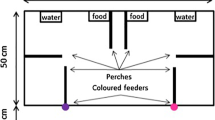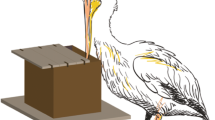Abstract
In this study we examined how social learning of feeding preferences by zebra finches was affected by the identity of different demonstrators. We presented adult zebra finches with two demonstrators, one male and one female, that exhibited different food choices, and we recorded their subsequent preference when given a choice between the two food types. Previously it was found that young zebra finches' patterns of social learning are affected by the sex of the individual demonstrating a feeding behaviour. This result could be explained by the lack of exposure these animals had to the opposite sex, or by their mating status. Therefore, we investigated the social learning preferences of adult mated zebra finches. We found the same pattern of directed social learning of a different type of feeding behaviour (food colour): female zebra finches preferred the colour of food eaten by male demonstrators, whereas male zebra finches showed little evidence of any preference for the colour of food eaten by female demonstrators. Furthermore, we found that female observers' preferences were biased by demonstrators' relative feeding activity: the female demonstrator was only ever preferred if it ate less than its male counterpart.



Similar content being viewed by others
References
Avital E, Jablonka E (2000) Animal traditions: behavioural inheritance in evolution. Cambridge University Press, Cambridge
Beauchamp G, Kacelnik A (1991) Effects of the knowledge of partners on learning rates in zebra finches (Taeniopygia guttata). Anim Behav 41:247–253
Benskin CMH, Mann NI, Lachlan RF, Slater PJB (2003) Social learning directs feeding in the zebra finch (Taeniopygia guttata). Anim Behav (in press)
Boyd R, Richerson PJ (1985) Culture and the evolutionary process. Chicago University Press, Chicago
Cavalli-Sforza LL, Feldman MW (1981) Cultural transmission and evolution: a quantitative approach. Princeton University Press, Princeton, N.J.
Coleman SL, Mellgren RL (1997) Social enhancement and interference of food finding in zebra finches (Taenopygia guttata). J Comp Psychol 111:242–250
Coussi-Korbel S, Fragaszy DM (1995) On the relation between social dynamics and social learning. Anim Behav 50:1441–1453
Dolman CS, Templeton J, Lefebvre L (1996) Mode of foraging is related to tutor preference in Zenaida aurita. J Comp Psychol 110:45–54
Dorrance BR, Zentall TR (2001) Imitative learning in Japanese quail (Coturnix japonica) depends on the motivational state of the observer quail at the time of observation. J Comp Psychol 115:62–67
Lachlan RF, Crooks L, Laland KN (1998) Who follows whom? Shoaling preferences and social learning of foraging information in guppies. Anim Behav 56:181–190
Nicol CJ, Pope SJ (1999) The effects of demonstrator social status and prior foraging success on social learning in laying hens. Anim Behav 57:163–171
Swaney W, Kendal J, Capon H, Brown C, Laland KN (2001) Familiarity facilitates social learning of foraging behaviour in the guppy. Anim Behav 62:591–598
Zann RA (1996) The zebra finch: a synthesis of field and laboratory studies. Oxford University Press, Oxford
Acknowledgements
RFL would like to acknowledge the help of the students of the second-year ethology course, 2000 and 2001, who helped with pilot studies of this project, and Hans Dudart for help with animal care. Funding was provided by a Marie Curie Fellowship to RFL. This research complied with the laws of the Netherlands and was carried out with the approval of the Leiden University Animal Welfare Commission (UDEC).
Author information
Authors and Affiliations
Corresponding author
Rights and permissions
About this article
Cite this article
Katz, M., Lachlan, R.F. Social learning of food types in zebra finches (Taenopygia guttata) is directed by demonstrator sex and feeding activity. Anim Cogn 6, 11–16 (2003). https://doi.org/10.1007/s10071-003-0158-y
Received:
Revised:
Accepted:
Published:
Issue Date:
DOI: https://doi.org/10.1007/s10071-003-0158-y




